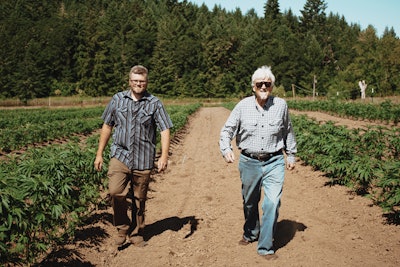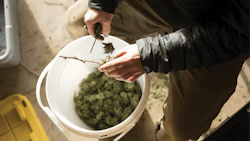
This article originally appeared in the July 2018 issue of Cannabis Business Times. To subscribe, click here.
The close bond between Glen and Dan James, the father-son duo behind Bosmere Farms, is obvious when you catch them discussing their business. For instance, when Dan, the farm’s director of operations, answers a question, Glen, the CFO, chimes in with additional details and prompts Dan to extol on his clever business plans, as any proud father would do for (and to) his son. And Dan, like any normal son, becomes sheepish by his dad’s interventions. The pauses before his answers ooze with playful eye-rolling toward his father.
Glen is right to be proud of his son. Thanks to Dan’s careful planning, Bosmere Farms, an outdoor cannabis cultivation business catering to Oregon’s adult-use market, has managed to do what many thought impossible: They reduced spending to where the company can budget production costs for a pound of cannabis at a mere $32 (depending on the year’s total yield). This cost-per-pound makes the family-owned and -operated business sustainable even when dried cannabis pounds wholesale for $100, as is currently the case in Oregon.
The key, according to the James family, is cutting costs (including their costs of living) to the bare minimum and focusing their production on the extract market—exclusively. In short, they are “bootstrapping” it.
“This is how you bootstrap, every step of the way,” Glen explains. “Take the issue, understand it, break it down, research the possibilities, talk to suppliers and work out the practical solution with what you have as resources.”
In true bootstrapping fashion, the family sold their homes and life insurance policies, cashed in 401(k)s and banded together to create their business. By the end of the financing spree, the only assets Glen and his wife (Dan’s mother) had to their names were two cars. Everything else went toward purchasing and developing the farm. When not working on the farm, family members spend free time working full- or part-time jobs to help make ends meet. “I like to think that we’re better off wanting what we have than having what we want,” Glen says. He lives with his wife in a fifth-wheel trailer, while Dan, his wife Emily, and their son live in the house—all on the new farm.
To read the full article in Cannabis Business Times' July 2018 issue, click here.
Top photo by Jake Gravbrot


























